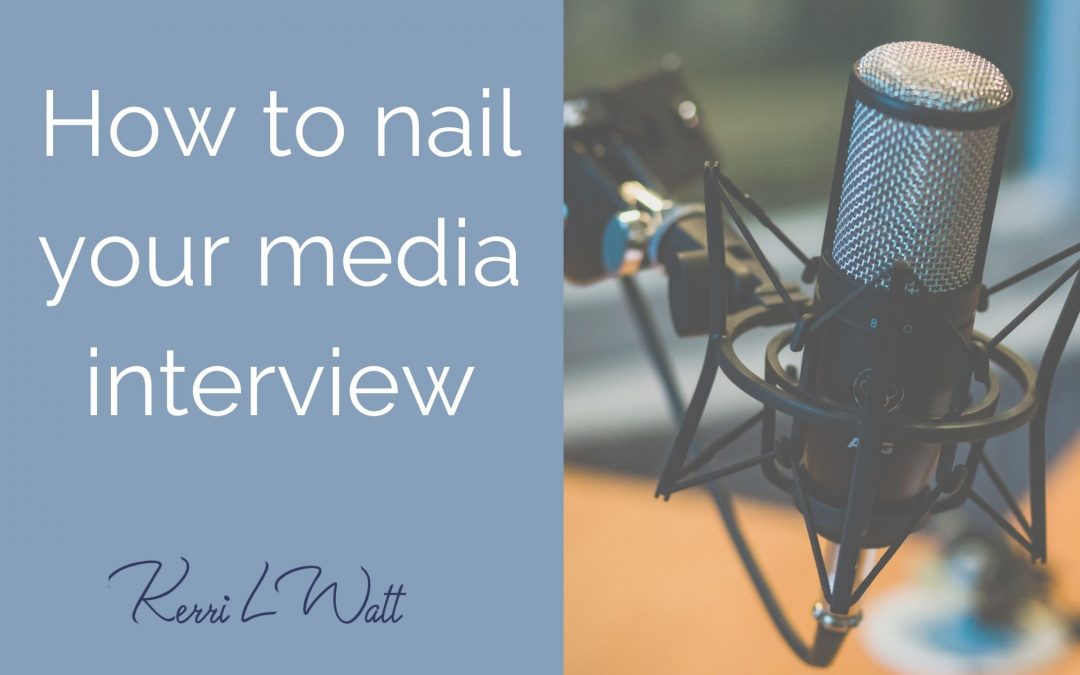Whether immediately or just before you go live, it’s totally natural for the nerves to kick in at any point after confirming a media interview. You worked really hard to secure this media opportunity and it’s easy for that to take your attention rather than the outcome of the interview itself and what it will do for your company.
The main thoughts I see from companies attending my media training days is often…
- What the heck do I wear?
- What if I say the wrong thing?
- What if I look like an idiot?
- What if I don’t have an answer for their question?
It’s easy to get overwhelmed by the thought of appearing in the media and worrying about things like what to wear or that you’ll look silly can take over the incredible opportunity. Devouring training tips for a media interview may seem like something for the celebs but, in reality, a quick research sesh on how to conduct yourself or what to focus on is a game changer.
Ideally you want to turn up to your media interview; whether on TV, radio or an informal phone call with a journalist for a piece they are writing; calm, relaxed and ready to put your point across.
I’ve collated 10 top tips for you to prepare for your next media interview.
1. Know your ‘key message’
It’s easy to get consumed thinking about what not to say in an interview so a good way to spin this into a more positive light is to focus on what you do want to get across. You can do this by writing down one key message that you want to be mentioned. That could be a certain fact or news that must be shared and potentially is the whole point of why you are having this interview. Each time an interviewer then asks a question, you can look for opportunities to stay on topic and bring your answers back to that key message.
If your interview is over the telephone or via video call, you can write your key message on a post-it note or piece of paper in front of you to keep it front of mind.
2. Take a deep breath
Right before your media interview, take time to clear your mind and breathe deeply. Turn your phone and any devices off, step away from your computer and just allow yourself to be present with your thoughts.
3. When you get stuck
When faced with a question you don’t feel appropriate, avoid saying things such as “but that’s not what I’m here to talk about” and “that’s not important, what is important is…”
It is possible to move the conversation along on to a point that you want to make and then communicate your message.
Phrases like “and that brings me on to…” or “it’s the same when…” are great ways to go from addressing a topic but moving back to the points you want to get across (your key message). Even one-word additions to your sentence such as ‘interestingly’ and ‘also’ will help get back on track.
4. Have a few statistics to hand
Powerful statistics can be useful to a journalist as they will then have the appropriate evidence to support mentioning your key messages you get across.
Too many statistics will create confusion so 1-2 is often enough. The more figures are thrown at your interviewer, the more chance there is for one of them to be published incorrectly.
5. Believe in yourself
You’ve been chosen for this interview for a reason, the media want to talk to you about your news or to hear your opinion on a topic. Whilst it’s easier said than done when faced with a camera staring at you, but try to be relaxed not be too nervous.
It’s amazing how quickly you will feel comfortable when you’re there with the team looking after you. Believe in what you are saying and your confidence will ensure viewers or readers believe you too.
6. It’s ok if you don’t know the answer
Whatever you are asked, always tell the truth. Whilst you don’t have to divulge everything in your business, anything you do say should be the truth. If you don’t know the answer to a question simply say so or say something along the lines of “you’ll have to talk to our marketing department for that information as I haven’t been involved with that project”.
If asked about a statistic or fact that you are unsure of, or perhaps need a little more time to think on, then a response of “I don’t have that figure in front of me but I’ll dig them out and get back to you” would be ideal. Make sure you then send them when you said you will.
When faced with a question you really don’t want to answer or don’t know the answer to avoid saying the famous “no comment” as this comes across that you refused to answer the question or have something to hide.
7. Take a minute
It is easy to forget a question when your nerves take over as you start to respond. If you need to pause, just stop. It will only take a few seconds for you to gather your thoughts again and give a more powerful response.
8. Speak clearly
Try not to rush through any of your answers while in a media interview. Journalists may be writing notes as well as any recordings so ensure you speak clearly and slowly enough for them to understand precisely what you have said so their final write up of your interview is written correctly.
 9. Be aware of leading & hypothetical questions
9. Be aware of leading & hypothetical questions
A leading question is one where you would be asked: “Isn’t it true to say this has become a huge concern for customers and a disaster for your reputation?” It would be easy to use their words here to respond with “I wouldn’t say this is a disaster for us but clearly it has caused problems for our customers”.
Quoting their negative words in your response with ‘disaster’ and ‘huge concern’ as part of your answer will not go in your favour as you accept the issues by including them in response. Instead of repeating their negative words.
In this example, ideally your response would be, “Our safety policies are constantly reviewed and our safety team are currently working hard on.”
It’s also best to not get pulled into hypothetical questions and things that haven’t happened and you don’t have to answer this if you don’t want to. Be very careful of these hypothetical questions because your answer could be the journalist’s headline of a news story.
Example of a hypothetical question would be “What if another more people at the hotel contract food poisoning?” or “What if someone was to die from the recent outbreak of food poisoning at your hotel?”
In your response, remember to bring in your key message and phrase your answer with positive wording. For instance, “We pride ourselves on taking health and safety extremely serious. We have investigated the recent incident confirming it as an accident and will continue to regularly review our safety procedures.”
If your interview is in response to a recent incident, you will no doubt be able to anticipate the journalist’s questions and prepare for these in advance too.
10. Now be patient
It is easy to want to see write up of your interview before it is printed but unless the journalist offers to send it to you then you will have to wait until it is in print or published online.
Keep on the journalist’s good side by gracefully waiting and not pestering them to review your interview. You never know, they could need you for another story or an expert comment in the future, so it’s important to keep them on your side and show how wonderful you are to work with.

